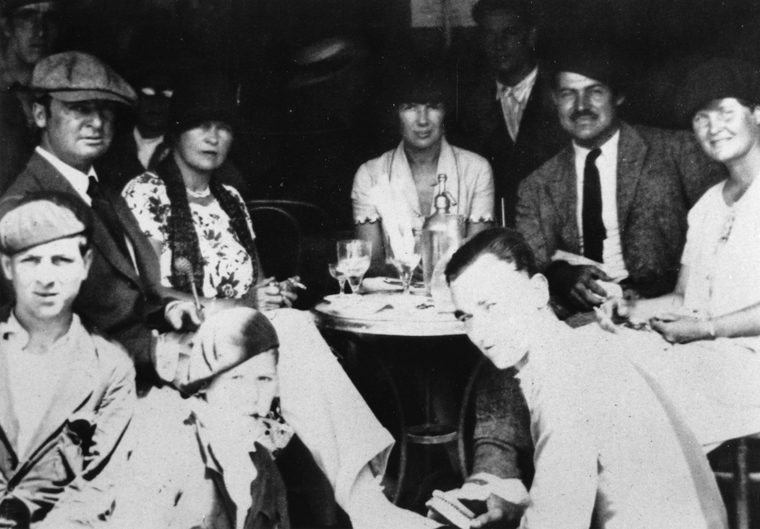What the ‘Lost Generation’ Got Right

As one version of the story goes, Ernest Hemingway heard it from Gertrude Stein, who heard it from a French garage owner. “You are all a generation perdue (lost),” said the garage owner to his mechanic, as Stein, matriarch of the American arts colony in 1920s Paris, listened nearby. She hadn’t been satisfied by the mechanic’s repairs to her Model T, which led to the garage owner’s broad condemnation of his employee, a former World War I soldier. The war’s devastation shook the faith many veterans once had in such traditional values as duty and diligence, compromising their usefulness to society. At least that’s how Stein seemed to interpret the allegation, for she later leveled it at another young man with war experience whom she thought lacked purpose, her friend Hemingway, and by extension, his louche companions. Finding it apt enough, Hemingway used it as an epigraph for his semi-autobiographical novel, The Sun Also Rises, published in 1926. The book not only launched his career, it also immortalized the epigraph, and the people.
Thanks to Hemingway, the term Lost Generation now connotes writers rather than soldiers, namely, the American exiles in postwar Paris known almost as much for their drinking, infidelities, and rivalries as for their literature. More specifically, the Lost Generation also refers to a community of tightly connected expatriate friends, which, besides Hemingway, included authors F. Scott Fitzgerald, John Dos Passos, and Archibald MacLeish, plus Gerald and Sara Murphy, an unconventional couple whose creativity lay not in writing but in “living well.” Exactly a century ago, the Murphys arrived in Paris and soon after established an idyllic outpost on the French Riviera, which they called Villa America. It was there that the Lost Generation supped, sunbathed, and bound themselves together, in some cases for a lifetime. “You loved your friends and wanted to see them every day,” Sara Murphy remembered.
That love belied Stein’s insinuation that the Lost Generation lacked purpose. Despite their personal problems and bad behaviors, they found purpose in their friendship, and, relatedly, through their writing. The practices and attitudes that sustained them and wove them together for decades—largely played out at Villa America—are worth revisiting, as new generations try to make their lives meaningful in a similarly unsettled time. Here are five:
- Nourish your body and mind with good things: A meal of gnocchi, tomatoes, and peaches and cream supplied by the villa’s gardens, orchards, and two cows might have preceded a costume party on the beach, a lively chat about the Ballets Russes, or cocktails served on the fragrant terrace as Louis Armstrong played on the gramophone. The Murphys prized freshness and originality over ostentation in food, conversation, and art.
- Involve your children: Unusual for the time, adventures at the villa often centered around the assembled youngsters, whether it was a treasure hunt, toy soldier battle, or jaunt to the lighthouse in search of fairies. The Murphys’ daughter addressed her parents’ friends by their first names and remembered Fitzgerald regaling her with stories and Hemingway showing her how to gut fish.
- Maintain your routine: Rise early and work; exercise by the sea (pausing for sherry and biscuits); eat lunch on the terrace; nap on cots under the trees (children only); swim; shop for food and flowers; dress up; dine; sleep.
- Pursue your craft relentlessly: Dos Passos recalled about Fitzgerald: “When he talked about writing his mind, which seemed to me full of preposterous notions about most things, became clear and hard as a diamond.” When not writing themselves, the Lost Generation thought, argued, and bantered about writing (theirs and others), and not accidentally, became some of the most important American writers of the twentieth century.
- Nurture your friends: The Murphys tolerated Fitzgerald’s immature hijinks, choosing to love the “region in him where his gift came from.” They supported the unpredictable Hemingway emotionally and financially, despite his occasional betrayals. After the Lost Generation made their way back to different places in America in the late 1920s and early 1930s, they saw each other and corresponded regularly. As the Murphys suffered through the illnesses and deaths of their two teenaged sons, their loyalty and generosity was reciprocated. Their Lost Generation friends comforted them in person and wrote tender letters. “Fate can’t have any more arrows in its quiver for you that will wound like these,” consoled Fitzgerald. “The golden bowl is broken indeed but it was golden.” The Lost Generation’s idyll had ended, but an intimacy capable of assuaging profound grief endured.
In hindsight, MacLeish concluded that it was “not the Lost Generation which was lost…[but] the world out of which that generation came.” To purpose-seekers in today’s COVID-rattled world, the Lost Generation would surely offer this advice: savor life, savor your friends.
Sharon Skeel is the author of Catherine Littlefield: A Life in Dance (Oxford University Press, 2020).